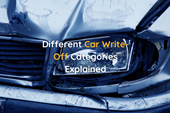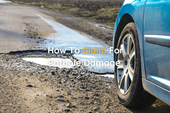
Factors That Affect The Price Of Your Car Insurance
Understanding Insurance Factors Could Save You Money...
Car insurance is mandatory for all drivers in the UK, but insurance prices vary wildly depending on a number of factors. Every insurance company will have their own set of risk factors that it will take into account, but there are some general rules that all insurers stick with in the UK.
The concept of insurance explains the need for this variance in pricing - in short, prices are determined on the risk of insurers having to pay out for a claim. If the circumstances around your car insurance mean you are more likely to make a claim, then expect to pay more.
This article is going to take a look at some of the major factors that insurance providers consider when taking on customers and creating car insurance quotes.
Your no-claims bonus
All car insurance policies will allow you to accrue a no claims discount or bonus for every year that you have driven and not made a claim on your insurance. In some cases, you can even get a form of no claims bonus as a named driver on a policy, which can go a long way to saving when the time comes for a car insurance policy in your own name.
"Insurance companies use voluntary excesses to offer lower prices, but also to dissuade people with a higher excess from claiming against smaller things, like scratches and dents."
One of the biggest factors that go into the overall price of your car insurance is how many years of no-claims bonus you have as well as any claims you have made in the past. If you have made a claim - particularly an ‘at-fault’ claim - then you will notice that your car insurance premium will increase the following year. That is because you have lost some of your no claims bonus.
Insurers view these types of claims as a risk, and use them as an indication that your driving might make you more likely to claim again. As the risk of a claim increases, your price will too. In essence, careful driving that is claim-free can make your policy cheaper.
Frustratingly, smaller accidents such as car park prangs often still need repairing, which, if going through your insurance, will impact your no claims bonus. If this is something you are concerned about, consider scratch and dent insurance, which allows for nationwide repair of smaller bumps and scrapes, without affecting your bonus.
Your driving experience
Car insurance companies are big fans of drivers with experience on the road. They view the experience of a veteran motorist as a strong indicator that they are careful, educated drivers. On the other side of things - young drivers will have to fork out eye-watering insurance premiums at the start of their driving journey as they are an unknown risk on the road.
Even if you don’t drive regularly, your insurance will drop significantly year-on-year due to the accumulated experience of driving and becoming more comfortable behind the wheel. If you drive less, you will also be less likely to make a claim, which insurers will recognise in their pricing.
Your vehicle
The make and model of your car will also have a significant bearing on your insurance price. Rare, expensive and vintage cars will be very expensive to repair and find parts for, which will leave insurance companies paying out considerably more than they would like to on any claims made. To mitigate this risk, the premium of car insurance policies will go up if you are driving an expensive, vintage or heavily modified vehicle.
To see a lower insurance price for your car, opt for a smaller, more common car. These will be much easier to repair if needed, which makes the associated risk for insurers lower. Ultimately resulting in a lower price for your car insurance.
Your car insurance excess
Your insurance excess is the amount of money you would need to pay in the event of a claim. There are generally two types of excess - voluntary and mandatory. With voluntary excess, you can choose how much you would be expected to pay, from £50 to £500 or even more.
Although you can lower your insurance policy price through voluntary excess, you leave yourself wide open to pay it if you ever have to make a claim. Insurance companies use voluntary excesses to offer lower prices and dissuade people with a higher excess from claiming against smaller things, like scratches and dents.
Your location
Many car insurance providers use postcodes to assess the risk of insuring cars across the UK. If you live and park your car in an area known for a high crime rate and high traffic levels, you will be paying more on your insurance than in a sleepy rural location.
Other Factors To Consider
Drivers often think insurance offers total peace of mind. However, if your car is declared a write off or total loss, then you could be financially liable, especially if your car has negative equity (For more information, read our blog on car depreciation). When your car is declared a total loss, insurers will often only pay the value of the vehicle at the time, not the amount you paid, or still owe; meaning that, if your car is worth much less, you'll have to make up the difference.
Consider Gap Insurance which makes up the difference following a write off from accident, fire or theft.
Control your car insurance prices
Now that you know some of the biggest factors that go into car insurance prices, you can take a look at your own cover and see if there is anything that you would like to change. It could end up saving you a fair bit of money on your car insurance bill.












